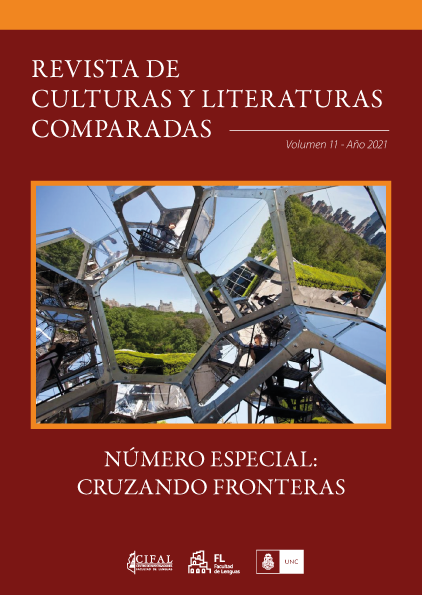Las representaciones de la otredad en Ensayo sobre la ceguera de José Saramago y Blindness de Fernando Meirelles
Keywords:
otherness, stereotyping, Saramago, film, Stuart HallAbstract
This paper proposes a comparative analysis between José Saramago's novel Blindness and Fernando Meirelles's film Blindness. Major focus is cast on the respresentation of the other and special attention is paid to the "stereotypes", according to Stuart Hall, as well as to his ideas developed in “The Spectacle of the Other”, “The Work of Representation”, and “The West and the Other: Discourse and Power”. The aim of this paper is to examine both the ways the other is represented, as in a significant continuous practice, and the discursive consequences of using these ways, since they work as directives in every discourse; not only because they involve feelings, attitudes and emotions but because, as the Jamaican critic claims, they calm fears and anxiety. And finally, in this manner, via this examination, the existence of radical differences between the two productions will be confirmed. On the one hand, when shaping his characters, the Portuguese writer is capable of abandoning every racial stereotype in order to achieve a more plural (not that universal but occidental) representation of the other which allows a profound meditation on the human dimension. On the other hand, in the film, Meirelles exacerbates these racial stereotypes which are representative of the occidental imaginary and that due to being naturalized in their normalcy in a Foucauldian way, transmit a hegemonic and discursive form of power which functions through culture, knowledge production, images, representations and even more means. By "stereotyping", based on our hypothesis, Meirelles's Blindness invites you to the typical hypnosis of commercial films without provoking critical thinking as it is, in turn, the case in Saramago's novel.
Downloads
References
Berrini, Beatriz. Ler Saramago. O romance. Lisboa: Caminho, 1998.
Diccionario de personajes saramaguianos. Buenos Aires: Santillana- Córdoba: EDUCC, 2008.
Ferrara, María Victoria. “Manual de pintura y caligrafía: un escritor que se da a conocer”. Apuntes saramaguianos II. José Saramago: un acercamiento al lector. Ed. Miguel Koleff. Córdoba: EDUCC, 2005. 39-60.
Gómez Aguilera, Fernando. José Saramago en sus palabras. Buenos Aires: Alfaguara, 2010.
Gómez García, Pedro. “Las desilusiones de la ‘identidad’. La etnia como seudoconcepto”. Las ilusiones de la identidad. Coord. Fernando Gómez Aguilera. Valencia: Fornesis. Universitat de Valéncia, 2000. 29-54.
Hall, Stuart. “The Rest and the West. Discourse and power”. Formations of Modernity. Eds. Hall and Gieben. London: Polity Press, 1992. 275-332. Traducción Ana Díaz.
---. “El trabajo de la representación”, Representation: Cultural representations and Signifying Practices. Ed. Stuart Hall. London: Sage Publications, 1997. 13-74. Traducción Elías Sevilla Casas.
---. “El espectáculo del otro”, Sin garantías: trayectorias y problemáticas en estudios culturales. Ed. Stuart Hall. Ecuador: Corporación Editorial Nacional, 2013. 419-445.
Halperin, Jorge. Saramago: “Soy un comunista hormonal”. Buenos Aires: Le Monde Diplomatique, 2002.
Koleff, Miguel. “José Saramago y el lugar de la lectura. (Introducción a su novelística)”. Apuntes saramaguianos II. José Saramago: un acercamiento al lector. Ed. Miguel Koleff. Córdoba: EDUCC, 2005. 13-16.
Meirelles, Fernando, dir. Blindness [Ceguera]. Perf. Julian Moore, Mark Ruffalo. Coproducción Brasil-Canadá-Japón; Alliance Films / Fox Film / Téléfilm Canada / Rhombus Media, 2008.
Said, Edward. Orientalismo. Madrid: Debate, 2002.
Saramago, José. Cuadernos de Lanzarote. Buenos Aires: Alfaguara, 1998.
---. Ensayo sobre la ceguera. Buenos Aires: Alfaguara, 2000.
---. “Antes el burócrata típico era un pobre diablo, hoy registra todo”, La Nación, Buenos Aires: 13 de diciembre de 2000.
---. Todos los nombres. Buenos Aires: Alfaguara, 1998.
Downloads
Published
Issue
Section
License

This work is licensed under a Creative Commons Attribution-NonCommercial-NoDerivatives 4.0 International License.
Aquellos/as autores/as que tengan publicaciones con esta revista, aceptan los términos siguientes:
a) Los/as autores/as conservarán sus derechos de autor y garantizarán a la revista el derecho de primera publicación de su obra, el cual estará simultáneamente sujeto a la Licencia de reconocimiento de Creative Commons.
b) La cesión de derechos no exclusivos implica que la publicación de los artículos en la presente revista no quita la posibilidad o el derecho al autor/a de publicar su obra de manera posterior en otras revistas u órganos editoriales y la autorización por parte de los/as autores/as para que el trabajo sea depositado en los repositorios institucionales, tales como el Portal de Revistas de la Universidad Nacional de Córdoba.



